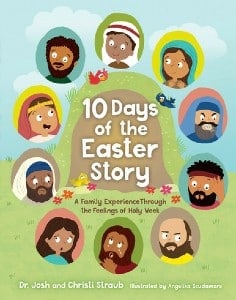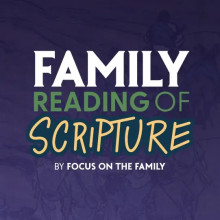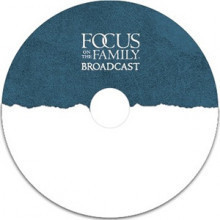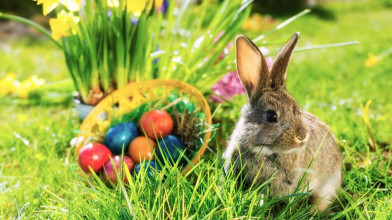Preview
John Fuller: When you think about Easter, I wonder what comes to mind. Is it rabbits? Chocolate? Colored eggs? Um, as Christians, we know there is so much more to Easter. Uh, it started with a triumphal parade and anger Jesus had about, uh, the misuse of God’s temple, the Last Supper, a brutal death, then a miraculous resurrection. And, as adults, that is so much for us to process, um, and it’s really hard for us to help our kids get into, uh, those truths and understand them. So today, on Focus on the Family with Jim Daly, we’re gonna explore the Easter story, its relevance to our lives, and how you as a parent can help your kids grab onto it. Thanks for joining us. I’m John Fuller.
Jim Daly: Well, John, the period of time, uh, around that first Easter had to be filled with amazing moments. Uh, we call it Holy Week, but if you just read it in the scripture, there’s a lot going on. A lotta chaos, really. And imagine how the disciples must have felt wondering if Jesus would become the King? Would He take over politically? Would He be the next leader in that way? And then you had Judas, uh, you know, betraying Him. You had Peter denying Him. Uh, there was just a lot of things happening and it’s good for us to understand it and better understand what were the motivations of people and what was happening. You know, we have the benefit of 2,000 years of history now. We get to look back and we get to see that what Jesus said is true. I mean, we are- should be envied as a generation.
John: Hm.
Jim: You know, we’re not in the midst of it thinking, “Is He the Messiah? Is He not the Messiah?” I think you can say very definitively Jesus was who He said He was. And we have, uh, still, people that have lots of questions about, uh, Jesus and His significance. And we’re going to help answer those questions today, especially for your children, which is so hard for them to kind of connect with, you know, what’s a bunny rabbit and a colored-
John: Yeah.
Jim: … egg have to do with Easter?
John: With Jesus, right.
Jim: So we’re looking forward to talking to two great friends about how to speak to your children about Easter.
John: Yeah, Josh and Christi Straub are back in the studio with us. We’re so glad to have them and, uh, we always get a great response when we talk with them. Uh, they are speakers and podcast hosts and co-founders of Famous at Home. They train leaders in emotional intelligence and, uh, really promote healthy families. They’re living a healthy family. They have three kids and, uh, Landon, Kennedy and Micah. They know something about the journey that so many of us are on or, uh, reflecting back, uh-
Jim: Yeah, (laughs) right.
John: … so positively about. Uh, one of the books they’ve written that, uh, we’ll mention here is 10 Days of the Easter Story: A Family Experience Through the Feelings of Holy Week. And we’ve got copies of that here. Uh, stop by focusonthefamily.com/broadcast or call 800, the letter A, and the word FAMILY.
Jim: Josh and Christi, welcome.
Christi Straub: Thank you.
Josh Straub: Thank you for having us.
Jim: Good to have you back.
Christi: We love being here.
Jim: Your smiles. I love your smiles. You just look joyful.
Christi: (laughs)
Josh: We love being here. Thank you.
Jim: I love it. Um, let me ask you this. John touched on it, but the whole idea of bunny rabbits and eggs. So, y- you know, for Jean and I, when our boys were younger, we were having this discussion. Do we talk about a rabbit? I mean, really, did the kids grow up thinking we’re lying to them? There is no big, uh, Easter Bunny that’s taking care of all this. Spiritually speaking and, you know, Jean was really great. We did the same thing with, uh, the other guy in December. You know-
Christi: (laughs)
Jim: SC.
Josh: (laughs)
Jim: I don’t wanna blow anybody’s cover, but we just weren’t- we felt it may not go down well with our boys if we’re deceiving them.
Christi: Yeah.
Jim: I mean, even playfully-
Christi: Yeah.
Jim: … about Santa Claus and maybe the Easter Bunny. So we were- we were not big on- on pretending that these people exist (laughs) and-
Christi: Yeah.
Jim: … deliver presents. But let me- t- this one let’s just get out of the way. At Easter, how do you begin to clarify this is Jesus and the true story and this is something we do for fun?
Christi: Well, it is confusing, isn’t it? Like, wait- wait, where did bunnies and eggs come into the picture? And then we’re talking about empty tombs and this horrific death. And, like-
Jim: Right.
Christi: … how do these go together? And I think it’s hard for … I mean, we’re parents raising kids in this generation alongside all of you. And it’s like-
Jim: How old are your kids? Just for-
Christi: So-
Jim: … the listeners.
Christi: So Landon’s 10-
Jim: (laughs) Yeah.
Christi: … Kennedy’s eight, and Micah’s just about to be three. So-
Jim: So right there you have a- a wide variety of understanding.
Christi: Yeah.
Josh: Oh, totally.
Jim: Yeah.
Christi: And it’s- And very limited understanding for some. Like, it’s what even is Easter? I think- And the reason I think it’s so important to us to even have this conversation today is because it really, like, it’s the crux of our faith. So if we’re, like, Jim, you’re saying, if we’re, like, telling them about Easter bunnies and going along with that. And I’m truthfully like we play along with some of the traditions so that the kids, like, there’s just a joy in hiding eggs-
Jim: Yeah, it’s fun.
Christi: … around the house. And- But with this, like, balance of and this is what is true.
Jim: Right?
Josh: Yeah. And I think, you know, for us, you know, one of the principles we hold to is one of the things that Christi’s mom, uh, would say to them growing up. You know, uh, the Easter bunny with- with- and with SC as well, uh, they’re-
Jim: (laughs)
Josh: … they’re- and this is the phrase is they are pretend, but in our home we pretend. And so just that idea of going, “Okay, yes, if they ask the question, we pretend or they’re pretend, but we pretend in our home.” And I think there’s a, uh, reality to we want our children to know the truth and we want them to understand that the truth sets them free.
Jim: Right.
Josh: And so that’s why, you know, yes. You know, and- and I get the Easter egg and the spring and the springing forth of new life and that, you know, being a representation to- to the resurrection, but I think so often what we do is we, uh, bypass the pain of- of the truth.
Jim: Mm-hmm.
Josh: We bypass the-
Christi: Yeah.
Josh: … suffering of the truth and we want to get to the resurrection. Sunday is coming. We use that phrase, Sunday is coming. And- And what we end up doing is- is we- we pacify things with eggs and- and the pretend stuff that culture brings into play. And then we focus on the good part of the Easter story of going, “Okay, Sunday’s coming. Jesus has rose from the dead.” But what we end up doing is we do- I think we do our kids a disservice by passing over. Jesus came to fulfill Passover by passing over the stuff that wasn’t so fun-
Jim: Yeah.
Josh: … during that week.
Jim: And- And what you’re saying, I- I mean, it’s dawning on me that it’s such a metaphor for the culture.
Christi: Yeah.
Jim: I mean, really.
Josh: Mm-hmm.
Christi: Isn’t it?
Jim: Rather than talk about what’s true-
Christi: Yes.
Jim: … and the things that are most important in life, let’s eat some chocolate. (laughs)
Christi: Yes.
Jim: Let’s- Let’s, uh, entertain bunnies and-
Christi: Yes.
Jim: … you know, fake things, but that is, too, that’s our culture.
Christi: Isn’t it?
Jim: Yeah. Let’s- Let’s, you know-
Christi: It’s this avoidance.
Jim: … consume-
Christi: Yeah.
Jim: … to the hilt and not talk about what’s most important in life.
Josh: Mm-hmm.
Jim: We just continue that whole fable forward.
Christi: Yes. It’s so-
Josh: Yeah.
Christi: It’s just like, you know, this whole … I- I don’t know. There’s this culture of, like, we medicate pain with, you know, we shop it away, or we eat it away, or we- (laughs) we over sugar it away. And it’s- it’s like we’re ingraining in our kids this- that coping mechanism.
Jim: Right.
Christi: And I just think there is such a better way for us to actually walk through with our kids hard things.
Jim: Yeah. And what I- what I love what you’re accomplishing with the book, 10 Days of the Easter Story, and you guys, you’re so intentional with this, is how to get your kids starting right- right from the get go-
Christi: Yeah.
Jim: … emotionally healthy.
Christi: Yeah.
Jim: I so appreciate that ’cause I don’t think as parents we … You know, we want them to be in sports. We want them-
Christi: Yeah.
Jim: … to do these things that demonstrate their physical well-being and their physical acuity.
Christi: Yeah.
Jim: And I don’t know that- I don’t think I was as in tune with their emotional health as you guys are coaching parents to be. And I think, man, it should probably start right there.
Christi: Yeah.
Jim: Emotionally healthy children. So when you look at connecting the Easter story for them to be-
Christi: Yeah.
Jim: … emotionally healthy, how- how does that work?
Josh: Yeah. Well, one of the things we wanted to do was, I mean, we wanted to take the Easter story and we wanted to look at what was actually happening, right? Uh, you know, researchers show that, you know, thinking, feeling and relating at the same time is where true growth happens. So in other words, if I’m just sitting in a classroom and I’m hearing somebody lecture, there’s a cognitive thing going on. But if there’s not great stories or I’m not emotionally engaged, I’m not as likely to remember what’s being taught.
Jim: That’s like a speaker.
Josh: It- Yeah.
Jim: An effective speaker.
Josh: An effective speaker is-
Jim: … sharing stories.
Josh: … gonna share stories. They’re gonna engage your emotion. And there’s thinking, feeling. And then there’s also relating. I- I’m entering into a relationship. This is why therapy is so effective, is because it, you know, or- or at least good healthy relationships, small groups where you’re doing life with people in your church, because there’s relational things happening. And so what we really wanted to do was give parents another tool to be able to take their children through the devotion of Easter, uh, to teach them the truths of scripture, but then to also help their children enter into that story and think about what is it that the characters or the people during that week, during that time of life, what were they experiencing? What were they actually feeling? What was actually going on? And what are ways that you experience that feeling today?
Jim: Yeah.
Josh: What are ways that you’ve experienced a lot of hope, like the hope of Palm Sunday, right? And- And the happiness of Palm Sunday or anger, right? When the Pharisees are angry, uh, and then Je- ’cause Jesus is flipping over the tables, but then Jesus getting angry be- and flipping over the tables or the surprise. I mean, you think about the Last Supper, think about the disciples at the Last Supper. What a, like, mind blowing-
Jim: (laughs) Yeah.
Josh: Like, if they had emojis back then, the mind blown-
Christi: (laughs)
Josh: … like emoji because Jesus shows up and He says, “By the way, one of you is gonna betray me.”
Jim: Yeah.
Josh: And they all look at each other like-
Jim: Who?
Josh: … “Who?”
Jim: (laughs).
Josh: And- And what are you talking about? Then, uh, He washes their feet-
Jim: Mm-hmm.
Josh: … which is, uh, for a servant to do. He- He tells them He’s going to die and temple being raised in three days. He tells them to drink of His blood and eat of His body. Like, you’re going, “What?” It-
Christi: (laughs)
Jim: (laughs)
Josh: I- I mean, just imagine being all the surprise that’s happening at the Last Supper. So we- we connect that with surprise and the surprise that they were going through. And- And so there’s so much happening and there’s so many of these feelings that our kids can relate with on a daily basis. We just put prompts in there-
Jim: Yeah.
Josh: …and ways that we can start helping our kids experience the feelings that they’re having and connect it to that story.
Jim: You know, one of the things I’m thinking of, because I didn’t grow up in a Christian home.
Christi: Mm-hmm.
Jim: So for me, I was, you know, I didn’t have traditions taught to me.
Christi: Yeah.
Jim: And, you know, I- I- I kinda struggled, I’d say, more as a teenager trying to-
Christi: Yeah.
Jim: … grab these concepts.
Christi: Yep.
Jim: And w- what you’re doing with your children at a younger age, what I love what’s happening there, y- y- you don’t have to get it all done in one fell swoop. You know, asking-
Christi: No.
Jim: … your three-year-old-
Christi: (laughs)
Jim: … are you ready to receive Jesus?
Josh: Yeah.
Jim: You’re laying the groundwork-
Christi: Yeah.
Jim: … and portraying the truth of scripture, et cetera.
Christi: Yeah.
Jim: And I just love that idea of it’s like the layers of an onion. You’re just creating that first layer for that-
Christi: Yeah.
Jim: … three-year-old to understand what’s true. And I think being mindful of that and intentional of that is so good. Christi, y- y- you were really honest about the fact that you struggled with the- the death and resurrection.
Christi: Oh.
Jim: I could so relate to you. I mean, I was 15 going, “Why would He have to do that?” I didn’t get it. What were your struggles as a child?
Christi: Well, it’s like Josh was just saying. Like, I mean, it’s just this most gruesome, like, you know, we use-
Jim: You were scared of it.
Christi: I was absolutely and almost disgusted. Like, here’s-
Jim: Mm-hmm.
Christi: … we’ll throw in another, a feeling word. Disgust is- it’s like, “I can’t watch that.” And you think about as parents, like, we try so hard to protect our kids from what they see-
Jim: Mm-hmm.
Christi: … on television, on, you know, apps and all the things. And I think there’s a whole generation of parents that are really recognizing how important that is and they’re really stepping up. But I almost wonder if we’ve swung the pendulum a bit to the other side where it’s like we’re- we’re so protecting them, what they see. And yet there’s this story about the man that we are to, like, give our lives for, we’re trying to introduce our children to, that died this gruesome death and we are protecting our children from death. And, like, don’t look at that, don’t see that. And then how do- awkward it is to try to explain this to kids, you know? And I just remember as a kid myself watching the Jesus movie. Do you remember this movie?
Jim: Oh, yeah.
Christi: You know?
Jim: Oh, yeah.
Christi: And like it gets to that. Like, “I’m fine, I’m fine, I’m fine. You’re fine.” And like triumphal entry and Palm Sunday and this is all great. And then you get to this horrible part where they’re, like, literally nailing his hands. And I just remember as a kid, like, actually feeling sick to my stomach.
Jim: Yeah.
Christi: And yet you have to watch this every year as a family, you know, as … And I’m never allowed to watch this stuff. And, like, normally-
Jim: (laughs)
Christi: … so why are we watching this now? And it just is this very strange introduction to v- I mean, it’s violent.
Jim: Right.
Christi: It’s gruesome. We don’t really see that that often in our protected little bubble worlds that we’re trying to, you know … And I think in really pure intention. We’re trying to protect children from things that they-
Jim: Shouldn’t see.
Christi: Shield them. Shield them, really, in ways that things that they shouldn’t see. And yet this is important-
Jim: Yeah.
Christi: … so how do we do this?
Jim: Yeah.
Christi: And I just realized how much of a struggle that was for me. And what Josh said, the whole church phrase of like it’s Friday, but Sunday’s coming. And I- I- though I get the sentiment, like, yes, we have hope. What about Saturday?
Jim: Yeah. Yeah.
Christi: Like, Saturday-
Jim: Was a bad day.
Christi: … was horrible.
Jim: Yeah.
Christi: And if I look at the world right now, we don’t know how to sit in a Saturday. And yet, I think that’s really what it feels like right now.
Jim: Yeah.
Christi: Like, if you look at the state of the world, it’s like, God, where are you? And, like, I don’t really feel a lot of hope right now. Like, it feels like darkness is winning.
Jim: Yeah.
Christi: And I think that’s what Saturday felt like. And I- I think the realization that there is this tolerance that we all need to develop. It’s almost like a muscle where we can sit in hard things and allow them. The- The- The overwhelm, you know, it’s like this tidal wave. I think we’re so afraid. I’ve heard so many people say to me, like, as we’re sitting with them in hard things, you know, in a- in a session where they’ll say like, “I- I don’t want to cry because I’m afraid if I start, I’ll never stop.”
Jim: Oh, my.
Christi: And I think that’s the belief, uh, and why- where we get this avoidant thing and we go to sugar and bunnies. (laughs)
Jim: Yeah.
Christi: Because it’s like if I actually touch upon this feeling, I’m afraid I’ll cry and I’ll never stop and the grief will overwhelm me. And the truth is actually the opposite. That’s why we’re so afraid to feel, is because we haven’t let ourselves … And grief really come … It- It comes in waves. Sadness comes in waves, anger comes in waves and we actually have to allow it. And it has to have a safe outlet. And as parents, that’s what we are for our kids, if we allow it.
Jim: Well, and I appreciate that because, again, that’s your great strength. That’s what the Lord’s called you to, it feels to me, is helping children particularly to be emotionally healthy.
Christi: Hm.
Josh: Yeah.
Jim: And to talk with them in such a way that they can be. I- I think, uh, the Easter story, again, it- it can be overwhelming to a child.
Christi: Yeah.
Jim: I mean, you wanted to get to Sunday quickly-
Christi: Yeah. (laughs)
Jim: … because that’s the-
Christi: We all do. Yeah.
Jim: … shazam, right?
Christi: Yeah.
Josh: Yeah, yeah.
Jim: That’s the big part of the story. It’s the Lord being raised from the dead-
Christi: Yeah.
Jim: … and appearing to people and it cements our faith.
Christi: Yeah.
Jim: And it is, as Paul himself, the apostle said.
Josh: Yeah.
Jim: You know, if Jesus didn’t rise from the dead, then our faith is pretty much-
Josh: Is in vain. Yeah.
Jim: Mute.
Christi: Mm-hmm.
Jim: And- But that’s what it all hinges upon.
Christi: Yeah.
Jim: So as we’re teaching our kids this, it’s- it- it can be difficult.
Christi: Mm-hmm.
Jim: Let me go back to something you mentioned. You said a lot in that statement, but the one thing, uh, that I want to punch here is our modern parenting style to kind of keep our kids pain free.
Christi: Yeah.
Jim: You know, bubble wrapping them. Not just physically, but emotionally, too, you know, to where they don’t have a dip. That’s- It’s proving through research that’s not a good thing.
Christi: Yeah.
Jim: Kids need appropriate challenges-
Christi: Yeah.
Jim: … to create resiliency in them.
Christi: Mm-hmm.
Jim: So speak to that issue of not being too cautious with the kids experiencing some grief and some pain.
Josh: Yeah, and I think what ends up happening is- is it comes back to our own parental fears. It comes back to our-
Christi: Yeah.
Josh: … own story. We don’t like anger or if we see anger in our kids, we want to just shut it out because I don’t want an angry child. I don’t want, you know, or anger within us.
Jim: Huh.
Josh: It triggered something within us from our own childhood where maybe we were told that anger was a bad emotion. We’re not supposed to feel, so we just pass that on to our kids. And- And so a lot of times this desire to not want our kids to experience those feelings is coming from our own story. And I think it’s important that we look at that story, uh, because Romans 5 is- is to- says to rejoice in suffering. With suffering comes perseverance and perseverance, character, and character, hope. And I think, you know, for us to be able to enter into our children’s story, get them to identify what is it that you’re feeling? Is it sad? Is it- Is it anger? Is it, uh, um, embarrassed? Is it rejected? Uh, is it fear? What are you experiencing? And to be able to allow our kids to sit in that and to listen to them in that without getting overwhelmed ourselves as parents-
Christi: Mm-hmm.
Josh: … gives our children the ability to say that it’s okay. You have permi- and- and it’s actually a good thing ’cause our ability to experience a wide range of emotion is what leads to emotional he- and- and spiritual health.
Jim: Mm-hmm.
Josh: If- If- If you shut out the negative or the uncomfortable emotions, you also teach your body to shut out the positive. And that’s when we turn to the chocolate and the Netflix and all the other stuff-
Jim: Wow.
Josh: … to calm and soothe us.
John: Yeah. Well, a big topic today as we’re talking about Easter and the emotions of Easter. And how do we, uh, talk about those and help our kids process all of those emotions? We have to start with ourselves, is what you’re saying. Our guests are Josh and Christi Straub and this is Focus on the Family with Jim Daly. Uh, get a copy of this terrific little book, 10 Days of the Easter Story: A Family Experience Through the Feelings of Holy Week. We have it here. You’ll find it at focusonthefamily.com/broadcast.
Jim: One of the things that you talk about and you develop and practice, uh, is this idea of e- emotional safety as a family.
Christi: Hm.
Jim: Some people won’t even understand what- what you’re aiming at there, so describe what emotional safety is within the family.
Josh: Yeah. I think it- it more has to do with the posture from which-
Christi: Right.
Josh: … we parent more than the techniques.
Jim: Okay.
Josh: You know, I think we, in the day to day, we get so caught up in the techniques. We have a, as- as you were talking, John, earlier, the trying threes. We have a- one who’s walking into the threes. He- It’s all about mine. It’s all about me. It’s- He’s getting- letting his voice be heard.
Jim: (laughs).
Josh: And I think so often as parents we get overwhelmed in those moments.
Jim: Oh, yeah.
Josh: And it’s all about techniques. Should I spank or not spank? Do I do time ins or timeouts?
Jim: Mm-hmm.
Josh: Do we, you know, do we, you know, uh, breastfeed or bottle feed? Do we co-sleep or not co-sleep? We get so overwhelmed by all these techniques, but the reality is is that techniques will always change.
Jim: Mm-hmm.
Josh: Uh, and- and one technique that works on one child today won’t work on that same child tomorrow. And one technique that works on a child- one child doesn’t work on another child. So techniques will always ebb and flow. And those are one, uh, way relationships. It’s- It’s a one way. It’s- It’s me as a parent-
Jim: Gotta manage the moment.
Josh: Yeah.
Christi: Yeah.
Josh: It’s me as a parent in, uh, you know, prescribing something or putting something on my child. The posture from which we parent should never change. And the way we describe that is that, you know, first John 4 says that perfect love cast out fear. And I think anytime that we are leading in fear as a parent, whether it’s our parental fears, our parental agenda, uh, whatever that looks like where we’re coming in with a- with our own agenda or we’re, you know, shutting our child down because of our own fear rather than entering into their story. And- And the way I describe this is leading in grace and following in truth. It’s Jesus with the woman at the well. It’s Jesus with the woman-
Christi: Mm-hmm.
Josh: … caught in adultery.
John: Yes.
Josh: He’s always showing up with grace and he’s entering their story before He ever reveals who He is. And I think that’s a- a framework for us as parents, to be able to lead in grace with our kids and enter their world and asking questions of what’s going on? What’s- What’s going on in your heart right now? What’s the disobedience about? What’s the disrespect about? Did something happen? How can I help you? And of course we want to follow up in truth. There- There’s gotta be consequences to disrespect and misbehavior, but I think so often we’re- we’re leading in truth-
Jim: Mm-hmm.
Josh: And- And we’re missing the grace component. And- And to me, emotional safety really is that posture of how do we lead in grace.
Jim: Well, that- that is so critical when you talk to 20, 30 somethings and their experience, especially growing up in a Christian home.
Christi: Mm-hmm.
Jim: Never feeling like they could get to the bar that’s been set.
Josh: Hm.
Jim: Always being somewhat shamed that I wasn’t performing well enough.
Christi: Yeah.
Jim: Those are the beginnings of a difficult adulthood.
Christi: Yeah.
Josh: Yeah.
Jim: You know, things that you bring in. And as parents, our job, I believe, before the Lord is to deliver healthy 18, 19 year olds emotionally-
Christi: Yeah.
Jim: .. right?
Josh: Yeah.
Christi: Yeah.
Jim: Let me- Let me ask you, too, Josh. You- You grew up I think experiencing Easter at your grandmother’s church. I think you referred to her as Mee-maw.
Josh: Mee-maw. Yeah.
Jim: I didn’t have the Mee-maw-
Josh: Yeah.
Jim: … but, uh, we didn’t have extended family, so I never had that-
Josh: Yeah.
Jim: … experience. But-
Christi: Yeah.
Jim: … what was it like being with Mee-maw and Mee-maw’s attitude toward teaching you about Easter?
Josh: Yeah. Oh, my goodness. So, um, I get tears thinking about it.
Christi: Hm.
Josh: Um, every s- Easter Sunday we would show up at my Mee-maw’s church and, um, we wouldn’t go to- we went to a separate church, but we would show up at my Mee-maw’s church. And I remember, um, singing the hymns. You know, uh, Christ, the Lord has risen today. Alleluia. And, um, and then we would go to her house and we’d, you know, find Easter eggs and we’d do all these things, but, um, there was such a deep … Like, you talk about thinking, feeling, and relating at the same time.
Jim: Mm-hmm.
Josh: Like I’m welling up in tears thinking about that ex- experiential moment of singing those songs and going to Easter Sunday service and engaging in those activities with my family that just connected my faith. And my parents, uh, growing up were nominal believers. I mean, we went to church every Sunday, but it wasn’t like we were doing devotions every day and we weren’t … You know, but I always believed in my Mee-maw was such an anchor for that.
Jim: Mm-hmm.
Josh: And I just really want to encourage families to find those experiences, find those traditions in your family that will help your kids think, feel, and relate. And they’ll have a connection point back to, a faith connection point back to in their childhood to look back and- and have a similar experience when they’re in their 40s to tear up, to go, “Man, my parents showed up for me in this way. They taught me faith in this way.”
Christi: Mm-hmm.
Jim: Yeah. Yeah, you know, sometimes in that parenting role our judgment gets so clouded that we don’t even know that the simple things we’re doing.
Christi: Yeah.
Josh: Yeah, see.
Jim: Now I’m getting teary eyed for you.
Christi: Yeah.
Jim: But those simple things that we do are building incredible foundations for these kids.
Josh: Right.
Jim: You know, just stability.
Christi: Yeah.
Jim: Being married, loving each other in front of your children.
Christi: Yeah.
Jim: Having dinner together at night, having discussion.
Christi: Yeah.
Jim: These aren’t difficult things to do. Just consistency for your kids to see.
Christi: Yeah.
Jim: And then your kid will be 40 and serving the Lord going, “Wow, what did I have that was so special?”
Christi: Yeah.
Josh: And I’m so grateful you said that because we so often beat ourselves up, especially over the emotional stuff, because we- we get caught up in the day to day.
Christi: Yeah.
Josh: And I just want to say to parents out there, like, it is hard. It is difficult. And yet simply showing up, simply doing the exact things you just walked through.
Jim: Yeah.
Josh: It’s Deuteronomy 6. You know, you’re showing up for dinner. You’re, you know, you’re, uh-
Jim: Engaged.
Josh: … resolving conflict, you’re engaged, you’re … And then- And when we do mess up, because we will, being able to apologize to our kids, just seeking their forgiveness is everything-
Jim: Yeah.
Josh: … in our relationship.
Jim: Well, I so appreciate. And to- to hit this again, don’t be, uh, kind of about tactics. Be about heart.
Josh: Yeah.
Christi: Yeah.
Jim: Tactics will change. And-
Christi: Yeah.
Jim: … the way you do it at eight years old, parenting that 8-year-old will be different from 15. So your tactics will change, but the heart is what-
Josh: Yeah.
Jim: … it’s about, that grace and truth-
Christi: Yeah.
Jim: … delivered. Man, this time has flown by.
Josh: Hm.
Christi: (laughs)
Jim: I cannot believe it. But for the parents, 10 Days of the Easter Story, start the discussion. This is a great time to do it. If you have that three-year-old, the-
Christi: Mm-hmm.
Jim: … eight-year-old, the 10-year-old, the 15-year-old, uh, to help them better understand what was going on that week that we rest everything on, that our faith is built upon. And to help your kids manage and understand those emotions. Uh, boy, you’ve delivered. Thanks so much for being with us.
Josh: Thank you for having us.
John: Contact us today to get Josh and Christi’s book, 10 Days of the Easter Story: A Family Experience Through the Feelings of Holy Week. We’ll send you a copy when you make a monthly pledge of any amount to this ministry. Or if you’re not in a spot to do that, make a one-time donation. The number is 800, the letter A, and the word FAMILY. 800-232-6459. Or visit focusonthefamily.com/broadcast to donate.
Jim: And, John, let me say this to our listeners. If you’ve benefited from any of the programming or have received help from our resources, can I encourage you to pay it forward by making a monthly pledge to the ministry? That’s how Jean and I support Focus. Uh, and John, you and Dena do the same.
John: We do as well, yes.
Jim: Our research shows that only about 1% of those who listen or watch the program on YouTube actually donate to Focus. And thanks to the generosity of those folks, we’re able to help more than 600,000 moms and dads improve their parenting skills, build stronger relationships in their families, and pass on their faith to their children. That’s amazing. It’s- It’s big what can be accomplished, but imagine how much more families would be impacted if we could increase that support team to 2% or 3%. That would work together to strengthen even more marriages, equip even more parents, and spread the good news to even more people about Jesus. Consider a monthly pledge to focus on the family today and let me say thank you in advance for your generosity.
John: And once again, our number is 800, the letter A and the word FAMILY, or donate at focusonthefamily.com/broadcast. And at our website, we’re gonna have a link to our family reading of scripture. Uh, now there’s an Easter video from Bible teacher Ray Vanderlaan and additional resources to make this, um, a really sacred, meaningful time for your entire family. This family reading of scripture is free and we urge you to check it out today. And if you happen to be traveling with your family this summer, let me suggest a visit to Focus on the Family. We’d love to have you visit us here in Colorado Springs. Have a great weekend with your family and your church family as well. And plan to join us on Monday. We’re gonna have some comedy from John Branyan about airport security.
John Branyan: And they tell you don’t to give your bag. Don’t- Don’t give your bag to strangers. Don’t accept bags from people you don’t know. To can- Who does that? Nobody does that. Here, take this with you to Denver. Go, go. Go.





















